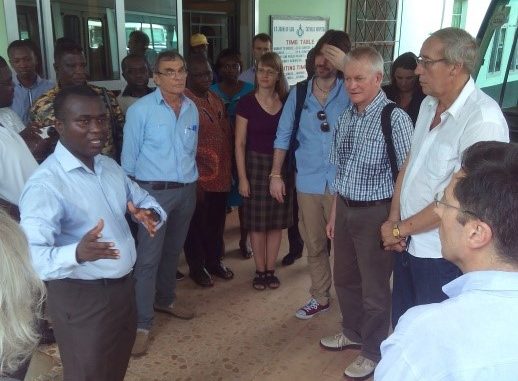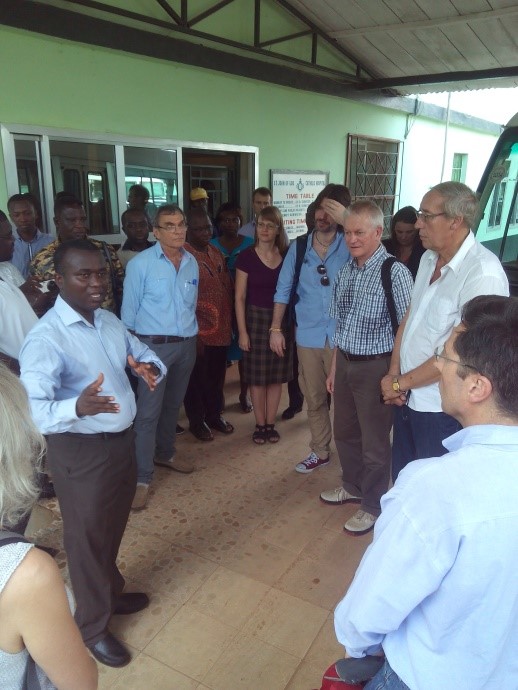
The Saint John of God Catholic Health Services provides medical and laboratory services, nursing education and health promotion. Commonly known as Mabesseneh Hospital and is located in Lunsar, the Organization springs from the Christian values and holistic approach practiced by its Founder Saint John of God. Its mission is to evangelise through the provision of accessible, affordable, efficient and acceptable quality health-related services to all people in Sierra Leone.
As a faith-based organization, it has demonstrated its commitment to work with other government and private health service providers that ensures a healthy nation.
Members of the European Parliament at Mabesseneh Hospital
The Chief Executive Officer of the Organization, Bro. Michael M. Koroma has described the leadership of President Dr. Ernest Bai Koroma during the Ebola fight as very successful, owing to the fact that the President took the lead in reaching out to everybody across the country during his social mobilization tour, which has led to Sierra Leone defeating the Ebola Viral Disease.
“As a hospital, we will continue to play an effective role to ensure that the government’s development agendas succeed,” he said.
However, in spite of the successes scored during the Ebola fight, Brother Koroma said the the hospital’s operations is plagued with challenges. “In order to restore full services commensurable to the health needs of the people, there is the need for unflinching financial and non‐financial resources from donors, volunteers and philanthropist until the hospital becomes resilient in dealing with the aftermath of the EVD,” he said during a presentation to a visiting delegation from the European Parliament.
The CEO further said in-spite of the challenges associated with the outbreak of the EVD, the hospital has been able to rejuvenate some of the essential services to clients through the efforts of its staff and donors. Patients’ fee which is the main source of income to the hospital, he said has dwindled due to low consultation by patients and inability of patients to pay their medical bills.
The Hospital is currently working in partnership with Friends of maternity Hospital to operate the first ever Safe Motherhood Promotion Centre in the country. The centre is currently providing lots of information to pregnant women about safe delivery and other related issues.
Madam Isha Daramy Kabia is a British Trained Midwife that is working as a Consultant at the Mabesseneh Hospital. She revealed that the organization is currently training Traditional Birth Attendants in villages with support provided to treat minor pregnancy cases. She pointed out that so far women have embraced the project and have demonstrated their willingness to get lots of information from the centre. What is lacking in the country, she said is post-natal care, which is very important as the antenatal care. So far, Madam Kabia revealed that they have recorded five safe deliveries due to the effectiveness of the Centre.
This is in fulfilment of the mandate and contract with the Public to run a General Hospital in the Marampa Chiefdom.
The future plans of the Mabesseneh Hospital are: to sustain safe practices, promote safe mother and new-born health activities, restore other essential health services to reduce mortality due to malaria, tuberculosis, and water borne diseases.
The headed by Norbert Neuser, said the Mabesseneh Hospital forms part of the origin of their visit to the country. In an interview with this press, he called for the need to bring together the government and faith-based health care service providers for effective and efficient services to be provided. He said so far they are satisfied with the way the hospital is operating. “You are playing a good role in the country and we will take the message across so that more support will come,” he promised, and further states that the hospital has clearly shown its eligibility to provide quality healthcare to the public. On the whole, he said the country’s health system is weak, but however promised that they will ensure that a program is in place to support the secondary health sector.




